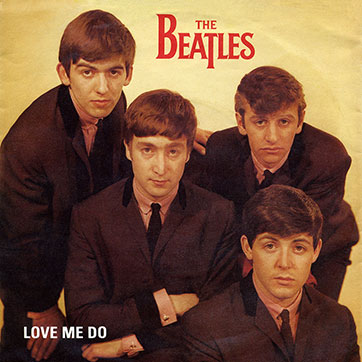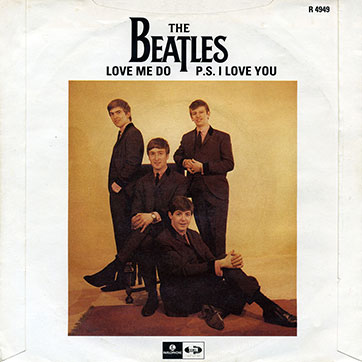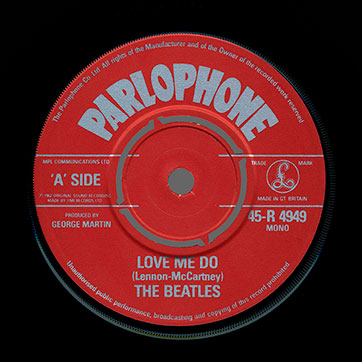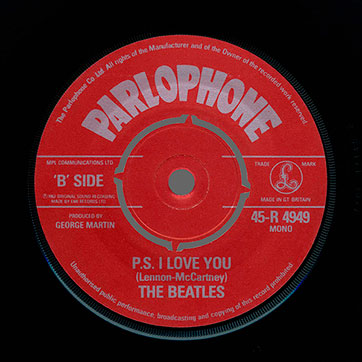Updated August 9, 2021

| Label (Company) |
|
|
| Country |
|
|
| Format |
|
|
| Number of records |
|
|
| Catalogue number |
|
|
| Catalogue number of side A |
|
|
| Catalogue number of side B |
|
|
| Matrix number of side A |
|
|
| Matrix number of side B |
|
|
| Mono or Stereo |
|
|
| Rotation speed, rpm |
|
|
| Re-release date |
|
Click on image to enlarge
Натисніть на картинку, щоб її збільшити
SLEEVE
ОБКЛАДИНКА
 |
 |
|
Picture sleeve, front side Художня обкладинка, лицьова сторона |
Picture sleeve, back side Художня обкладинка, зворотний бік |
LABELS
ЕТИКЕТКИ
 |
 |
|
Side A Сторона A |
Side B Сторона B |
SIDE A
N |
Title and authors |
Time |
Note |
|
Love Me Do (Lennon-McCartney) | 2:19 |
SIDE B
N |
Title and authors |
Time |
Note |
|
P.S. I Love You (Lennon-McCartney) | 2:02 |
NOTE
This is the 20th Anniversary edition.
Released initially as part of the box set The Beatles Singles Collection (BSC 1).
Subsequently released separately on the same day as the corresponding 20th anniversary picture disc.
In his editorial (subtitled 'A note to EMI') in Record Collector magazine (April 1982) Johnny Dean made a special plea to EMI to celebrate the 20th anniversary of the release of The Beatles' first Parlophone single by re-releasing that single in a picture sleeve, on 5 October 1982, and thereafter reissuing all subsequent releases on their 20th anniversary date. Dean also offered to assist in compiling the releases. Up to this point (April 1982) EMI had no plans whatsoever to celebrate the anniversary; however, on 4 October 1982, the repackage of Love Me Do appeared (as EMI's releases were now scheduled for a Monday as opposed to a Friday, the single came out one day before the official anniversary).
The single was pressed using a red Parlophone label; it differs from the original release as it has several label credit changes: the 1962 release credits "Ardmore & Beechwood Ltd" as the song publishers, while the new release credits "MPL Communications Ltd" (Paul McCartney's own company, who purchased the early Lennon and McCartney compositions from Ardmore & Beechwood Ltd). The 1982 release credits George Martin as producer, states that the recordings are mono and marks the A and B sides accordingly, while none of this information appeared on the original release.
Although EMI were trying to duplicate the original release with the red label, they did not use the original version of Love Me Do which appeared on the first release. This version is the second recording of Love Me Do - featuring Andy White (a member of the BBC Radio Orchestra in Glasgow) on drums, with Ringo playing tambourine - that appeared on the Please Please Me album and the black label pressing of the single.
ПРИМІТКА
Дане ювілейне видання, приурочене до 20-річчя першого виходу синґлу.
Спочатку воно було видано у складі боксу The Beatles Singles Collection (BSC 1). Згодом сингл було випущено окремо того ж дня, що й відповідний пікчер-диск, присвячений 20-річчю.
У своїй редакційній статті (з підзаголовком "Примітка для EMI") у журналі Record Collector (квітень 1982 р.) Джонні Дін звернувся до EMI з особливим закликом відсвяткувати 20-річчя випуску першого синґлу The Beatles Parlophone, перевидавши цей сингл у обкладинці з картинками від 5 жовтня 1982 року, а потім перевидавши всі наступні випуски до їхнього 20-річного ювілею. Дін також запропонував допомогу в складанні релізів. До цього моменту (квітень 1982 р.) у EMI не було жодних планів відзначати річницю; проте 4 жовтня 1982 року з'явилося перевидання Love Me Do (оскільки релізи EMI тепер були заплановані на понеділок, а не на п'ятницю, сингл вийшов за день до офіційної річниці).
Синґл було видано з використанням червоної етикетки Parlophone; він відрізняється від оригінального релізу, оскільки в ньому є кілька змін у назвах лейблів: у випуску 1962 року як видавців пісень зазначається "Ardmore & Beechwood Ltd", а у новому випуску вказано "MPL Communications Ltd" (власна компанія Пола МакКартні, яка придбала ранню версію Леннона) і композиції МакКартні від Ardmore & Beechwood Ltd). У випуску 1982 року Джордж Мартін зазначений як продюсер, вказано, що записи у моно, і відповідно відзначені сторони A і B, хоча у оригінальному випуску жодної цієї інформації не було.
Хоча EMI намагалися продублювати оригінальний реліз із червоною етикеткою, вони не використали оригінальну версію Love Me Do, яка з'явилася у першому релізі. Ця версія є другим записом Love Me Do за участю Енді Уайта (учасника оркестру BBC Radio у Глазго) на барабанах і Рінго, що грає на бубні, що з'явилася на альбомі Please Please Me і видана на синглі з чорною етикеткою.